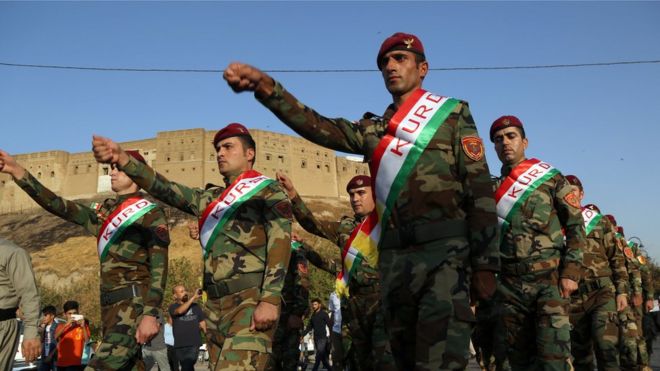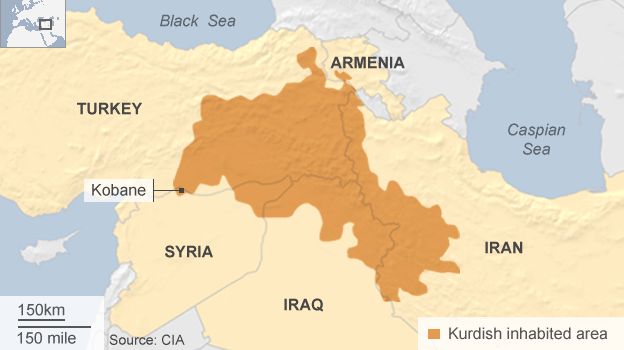Long Live Kurdistan
"How much progress have we really made if Iraq is so riven by internal divisions that new civil wars erupt -- between Sunni and Shia, between the Kurds and the central government, with ISIL, or its successors taking advantage of the various schisms and weakness of Baghdad at every turn?"
Peggy Mason, former disarmament ambassador, Canada; president, Rideau Institute, Ottawa
"I don't think they're [government of Iraq] going to say, 'Sure, take the oilfields and Kirkuk and go your way."
"It's not going to go peacefully."
General Raymond Thomas, head, US. Special Forces Command
 |
| Marches in support of the vote took place in Irbil last week EPA |
Kurdistan, the semi-autonomous and historical region where Kurds in their tens of millions have always lived had been bypassed by colonialist powers in apportioning territorial limits and borders to satisfy the demands of Arab Muslims, the majority population in the Middle East. The result has been that in Iran, Iraq, Syria and Turkey, the Kurds have been denied statehood, denied recognition of their heritage indigenous status, denied equality and been subject to gross instances of human rights infringements by the majority ethnic groups among whom they live.
In the modern era where Arab states with their defined borders erratically declared official by foreign interlopers whose 19th Century imperialist arrogance saw fit to install, prejudice and discrimination against minorities of ethnic, tribal, and religious groupings have run rife. Kurds, on the other hand, appeared to have few problems accepting others as equals deserving of equal treatment and security. More latterly they have proven themselves on the battlefield when their militias were the only groups capable of confronting the atrocity-laden excesses of Muslim Arab jihadists.
In the regional and international interests of combating the most recent of Islamofascist ideological campaigns for conquest and the installation of a caliphate, the Arab militaries of Iraq and Syria have failed spectacularly to defend their own territories, allowing them to fall to the Islamic State predators. Without the intervention of the West and later Russia, despite support from a hegemony-consolidation-seeking Iran and its proxy militia Hezbollah, it has only been the Kurdish peshmerga that could be relied upon to beat back the incursion of the Islamic State.
NATO-member countries have dispatched their military trainers to give support and training to Iraqi and Kurdish militias. Canada has spent its years of training with the Kurdish fighters. The Kurds have fought courageously for their homeland, their territory, the geographic area that they claim as their own and for which their aspirations to achieve statehood have been focused on. A referendum is on the near horizon where Kurds will vote formally in a democratic initiative for a declaration of independence.
This initiative has alarmed NATO-member Turkey which has fought an 'insurgency' launched by Kurds living in Turkey in their ancestral lands which Turkey continues to claim as its own. Neither Syria, nor Iraq is complacent about the potential for signing over part of their territory to its rightful owners, much less Iran. When Iraq had fallen apart after the removal of Saddam Hussein and the U.S.-led coalition was attempting to guide the country into an equal coalition of Sunni, Shia and Kurd in governing the country, it too failed.
The Kurdish region was the only part of Iraq that was capable of functioning with any degree of progress and normalcy, offering security to its people, and giving shelter to minority groups at deadly risk during the conflicts that erupted between Islamist terrorists, Shiite militias and Sunni minorities, and the threats to Christians and Yazidis and other minority groups were answered by Kurdish shelter, the assurances that living among the Kurds they would be safe.
In the years of turmoil brought on by the rise of ISIL, the Kurds managed to claim areas of Iraq that have been historically theirs through thousands of years of habitation before national borders were drawn. They have also claimed 40 percent of the geography's oil resources, along with Kirkuk; they are, after all, the majority population in those areas. Canada has been providing military training and equipment to Kurdish troops in northern Iraq for the past three years pursuing the common goal of ousting ISIL.
Now Canada sees itself in a quandary; not a new one, since the prospect of an independent Kurdistan was always recognized as a future problem. But the Canadian commandos who proudly wore Kurdish flags on their uniforms have been instructed to remove them, after the U.S. issued its decree to its troops that American special forces remove their Kurdish insignia from U.S. military uniforms, bowing to Turkey's complaints of the closeness to Kurds whom Recep Tayyip Erdogan considers "terrorists".

What the U.S. and Canadian governments see in the near future is a crisis unfolding, with Kurdish patience at an end and their determination to finally rule their own roost paramount for their future, resulting in the potential for civil war after the September 25 referendum results. The U.S. has denied support to the Kurds at this critical time in the evolution of their declaration of independent sovereignty, and Canada appears on the cusp of responding in the very same way; separating themselves from the very group they have most relied on to complete their mission of destroying the power of Islamic State.
Insisting at this point, when Islamic State has been virtually vanquished as far as its territorial ambition is concerned, that unity is required to ensure that the fight succeeds, no longer seems quite valid. Kurdish independence is answering the question that Kurds are asking themselves: "If not now, when?", for 'when' is always far off on the horizon, and Kurds have finally decided to draw it in.
Ironically, it is Israel and Israel alone, at this juncture that is finally giving moral support and recognition of timeliness to Kurdish independence. One semi-outcast struggling for survival supporting another. The enemies of Israel -- Iran, Syria and Turkey -- are all now left with the concern that their turn too will soon arrive when they will be forced to surrender Kurdish ancestral land to the people who claim it as their own.
Their denials reflect the very same rejection that Israel has always faced; a people returning to its roots.
Labels: Canada, Independence, Iran, Iraq, Kurdistan, Syria, Turkey, United States
0 Comments:
Post a Comment
<< Home